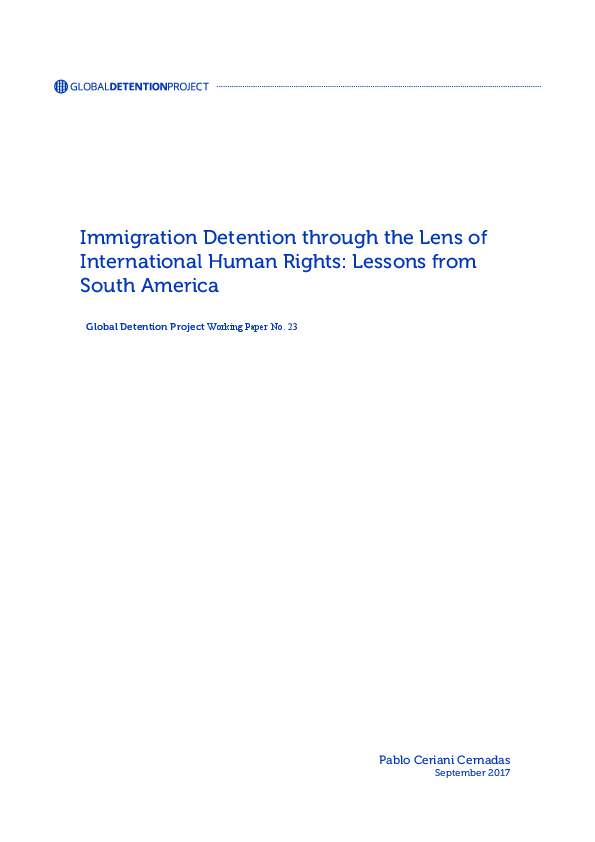In February 2018, with discussions under way at the United Nations on crafting a Global Compact on Migration, the United Nations High Commissioner for Human Rights released this open letter encouraging states to adhere to their commitment to develop “a compact that explicitly recognises and fully conforms to the existing international human rights framework as the authoritative protection agenda […]
Human Rights
First Perspectives on the Zero Draft for the UN Global Compact on Safe, Orderly and Regular Migration
Following the recent publication of the Zero Draft for a UN Global Compact for Safe, Orderly and Regular Migration, 17 expert academics—including GDP Researcher, Izabella Majcher—provide commentary on the positive and negative aspects of the Objectives, as well as the necessary follow up. […]

Immigration Detention in Greece
Immigration Detention in Greece (2018 Report) Greece is a key focus in Europe’s efforts to halt irregular migration flows. However, the country’s immigration detention laws and practices have been repeatedly denounced by observers, who have pointed to numerous abuses, including the systematic use of detention of vulnerable migrants and asylum seekers, the failure to apply alternatives […]

Immigration Detention of Children: Coming to a Close?
Immigration Detention of Children: Coming to a Close? The GDPs Michael Flynn participated in this two-day conference co-hosted by the Council of Europe and the Czech Ministry of Justice (25-26 September 2017). “Are There ‘Alternatives’ for Children?” By Michael Flynn Summary: Is it possible to develop “alternatives to detention” in a way that does not […]

Joint Submission to the Universal Periodic Review (UPR): Germany
Germany Joint Global Detention Project and Jesuit Refugee Service Germany Submission to the Universal Periodic Review 30th session of the UPR Working Group, May 2018 Submitting organisations The Global Detention Project (GDP) is an independent research centre based in Geneva, which investigates the use of detention as a response to international migration. Its objectives […]

Global Detention Project Submission concerning the Global Compact for Safe Orderly and Regular Migration
The GDP submitted comments to the UN Special Representative for International Migration as part of the preparatory phase for the Secretary-General’s report on the Global Compact for Migration. The submission focuses on immigration detention, improved transparency and data collection on the human rights of migrants, and concerns about the human rights commitments of international organizations involved in global migration governance. […]

Challenging Immigration Detention: Academics, Activists, and Policy-Makers
Governments increasingly rely upon detention to control the movement of undocumented migrants and asylum seekers. Approaching detention from an interdisciplinary perspective, this new edited volume brings together leading writers and thinkers to provide a greater understanding of why it is such an important social phenomenon and suggest ways to confront it locally and globally. […]

Immigration Detention through the Lens of International Human Rights: Lessons from South America
Why hasn’t South America witnessed the same growth in immigration detention regimes that has occurred in the rest of the world? This Global Detention Project Working Paper discusses developments across the region through the lens of international human rights standards. […]

Submission to the UN Committee on Migrant Workers: Libya
Global Detention Project Submission to the UN Committee on Migrant Workers 27th Session (4-13 September 2017) List of issues under the simplified reporting procedure – Libya Geneva, August 2016 Issues concerning immigration detention The Global Detention Project (GDP) welcomes the opportunity to provide information relevant to the list of issues under the simplified […]

Submission to the UN Committee on the Rights of the Child: Denmark
Global Detention Project Submission to the UN Committee on the Rights of the Child (CRC) 76th Session (11 – 29 September 2017) Consideration of State Report – Denmark (fifth period report) Geneva, 10 August 2017 Issues concerning immigration detention The Global Detention Project (GDP) welcomes the opportunity to provide information for consideration of […]



